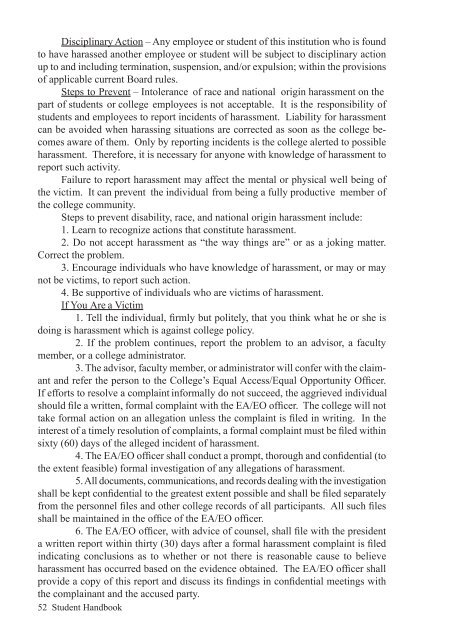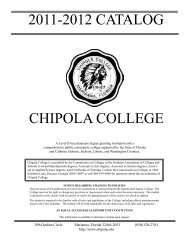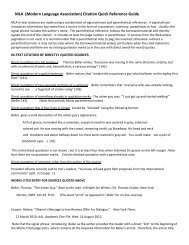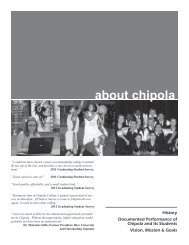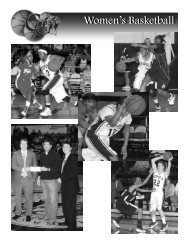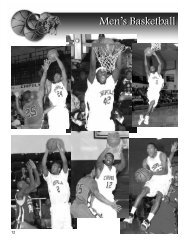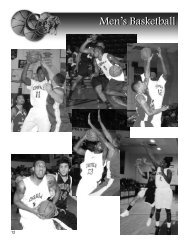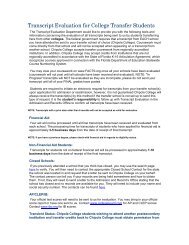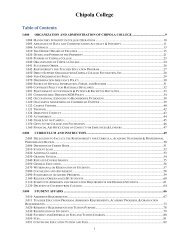Student Handbook - Chipola College
Student Handbook - Chipola College
Student Handbook - Chipola College
Create successful ePaper yourself
Turn your PDF publications into a flip-book with our unique Google optimized e-Paper software.
Disciplinary Action – Any employee or student of this institution who is found<br />
to have harassed another employee or student will be subject to disciplinary action<br />
up to and including termination, suspension, and/or expulsion; within the provisions<br />
of applicable current Board rules.<br />
Steps to Prevent – Intolerance of race and national origin harassment on the<br />
part of students or college employees is not acceptable. It is the responsibility of<br />
students and employees to report incidents of harassment. Liability for harassment<br />
can be avoided when harassing situations are corrected as soon as the college becomes<br />
aware of them. Only by reporting incidents is the college alerted to possible<br />
harassment. Therefore, it is necessary for anyone with knowledge of harassment to<br />
report such activity.<br />
Failure to report harassment may affect the mental or physical well being of<br />
the victim. It can prevent the individual from being a fully productive member of<br />
the college community.<br />
Steps to prevent disability, race, and national origin harassment include:<br />
1. Learn to recognize actions that constitute harassment.<br />
2. Do not accept harassment as “the way things are” or as a joking matter.<br />
Correct the problem.<br />
3. Encourage individuals who have knowledge of harassment, or may or may<br />
not be victims, to report such action.<br />
4. Be supportive of individuals who are victims of harassment.<br />
If You Are a Victim<br />
1. Tell the individual, firmly but politely, that you think what he or she is<br />
doing is harassment which is against college policy.<br />
2. If the problem continues, report the problem to an advisor, a faculty<br />
member, or a college administrator.<br />
3. The advisor, faculty member, or administrator will confer with the claimant<br />
and refer the person to the <strong>College</strong>’s Equal Access/Equal Opportunity Officer.<br />
If efforts to resolve a complaint informally do not succeed, the aggrieved individual<br />
should file a written, formal complaint with the EA/EO officer. The college will not<br />
take formal action on an allegation unless the complaint is filed in writing. In the<br />
interest of a timely resolution of complaints, a formal complaint must be filed within<br />
sixty (60) days of the alleged incident of harassment.<br />
4. The EA/EO officer shall conduct a prompt, thorough and confidential (to<br />
the extent feasible) formal investigation of any allegations of harassment.<br />
5. All documents, communications, and records dealing with the investigation<br />
shall be kept confidential to the greatest extent possible and shall be filed separately<br />
from the personnel files and other college records of all participants. All such files<br />
shall be maintained in the office of the EA/EO officer.<br />
6. The EA/EO officer, with advice of counsel, shall file with the president<br />
a written report within thirty (30) days after a formal harassment complaint is filed<br />
indicating conclusions as to whether or not there is reasonable cause to believe<br />
harassment has occurred based on the evidence obtained. The EA/EO officer shall<br />
provide a copy of this report and discuss its findings in confidential meetings with<br />
the complainant and the accused party.<br />
52 <strong>Student</strong> <strong>Handbook</strong>


